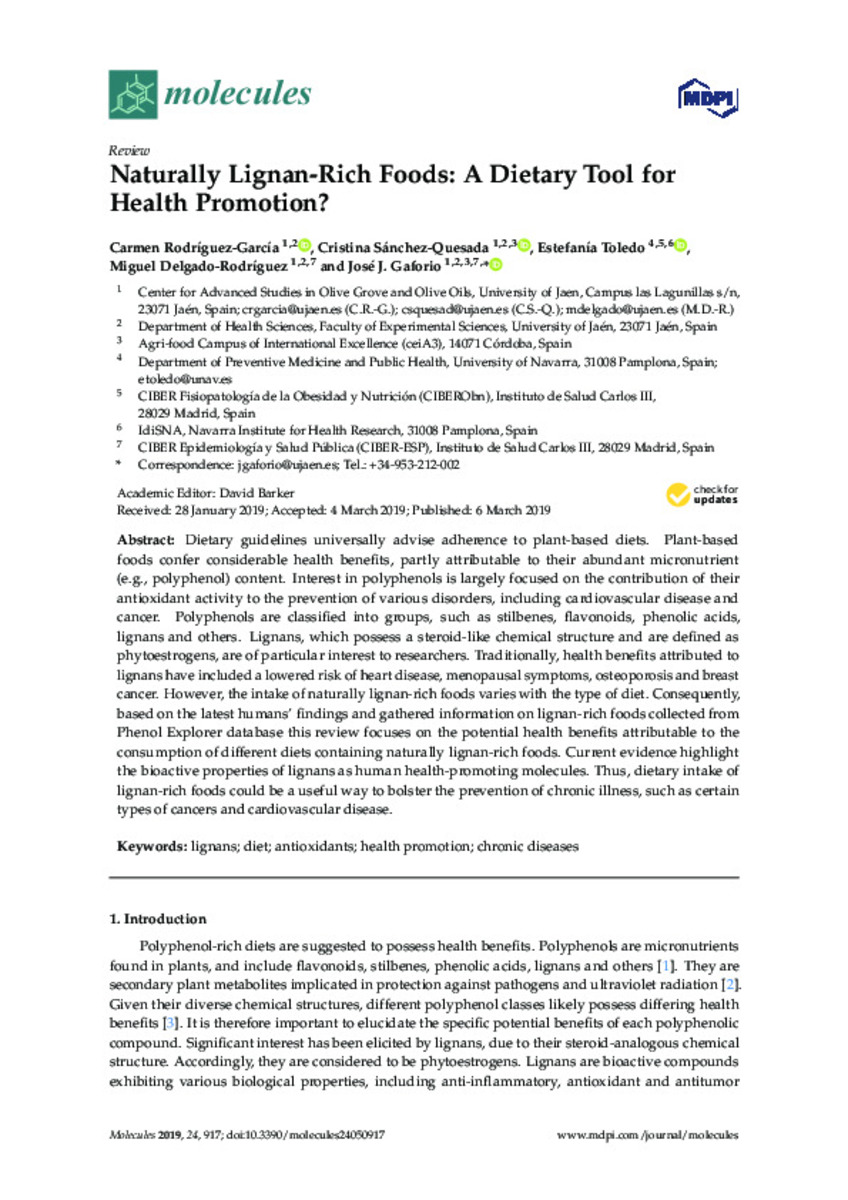Full metadata record
| DC Field | Value | Language |
|---|---|---|
| dc.creator | Rodríguez-García, C. (Carmen) | - |
| dc.creator | Sánchez-Quesada, C. (Cristina) | - |
| dc.creator | Toledo, E. (Estefanía) | - |
| dc.creator | Delgado-Rodriguez, M. (Miguel) | - |
| dc.creator | Gaforio, J.J. (José Juan) | - |
| dc.date.accessioned | 2021-11-02T08:25:05Z | - |
| dc.date.available | 2021-11-02T08:25:05Z | - |
| dc.date.issued | 2019 | - |
| dc.identifier.citation | Rodríguez-García, C. (Carmen); Sánchez-Quesada, C. (Cristina); Toledo, E. (Estefanía); et al. "Naturally lignan-rich foods: a dietary tool for health promotion?". Molecules. 24 (5), 2019, 917 | es_ES |
| dc.identifier.issn | 1420-3049 | - |
| dc.identifier.uri | https://hdl.handle.net/10171/62298 | - |
| dc.description.abstract | Dietary guidelines universally advise adherence to plant-based diets. Plant-based foods confer considerable health benefits, partly attributable to their abundant micronutrient (e.g., polyphenol) content. Interest in polyphenols is largely focused on the contribution of their antioxidant activity to the prevention of various disorders, including cardiovascular disease and cancer. Polyphenols are classified into groups, such as stilbenes, flavonoids, phenolic acids, lignans and others. Lignans, which possess a steroid-like chemical structure and are defined as phytoestrogens, are of particular interest to researchers. Traditionally, health benefits attributed to lignans have included a lowered risk of heart disease, menopausal symptoms, osteoporosis and breast cancer. However, the intake of naturally lignan-rich foods varies with the type of diet. Consequently, based on the latest humans’ findings and gathered information on lignan-rich foods collected from Phenol Explorer database this review focuses on the potential health benefits attributable to the consumption of different diets containing naturally lignan-rich foods. Current evidence highlight the bioactive properties of lignans as human health-promoting molecules. Thus, dietary intake of lignan-rich foods could be a useful way to bolster the prevention of chronic illness, such as certain types of cancers and cardiovascular disease. | es_ES |
| dc.description.sponsorship | Carmen Rodríguez-García received a pre-doctoral research grant from the University of Jaén (Ayudas predoctorales para la formación del personal investigador, Acción 4). | es_ES |
| dc.language.iso | eng | es_ES |
| dc.publisher | MDPI AG | es_ES |
| dc.rights | info:eu-repo/semantics/openAccess | es_ES |
| dc.subject | Lignans | es_ES |
| dc.subject | Diet | es_ES |
| dc.subject | Antioxidants | es_ES |
| dc.subject | Health promotion | es_ES |
| dc.subject | Chronic diseases | es_ES |
| dc.title | Naturally lignan-rich foods: a dietary tool for health promotion? | es_ES |
| dc.type | info:eu-repo/semantics/article | es_ES |
| dc.description.note | This is an open access article distributed under the Creative Commons Attribution License which permits unrestricted use, distribution, and reproduction in any medium, provided the original work is properly cited. | es_ES |
| dc.identifier.doi | 10.3390/molecules24050917 | - |
| dadun.citation.number | 5 | es_ES |
| dadun.citation.publicationName | Molecules | es_ES |
| dadun.citation.startingPage | 917 | es_ES |
| dadun.citation.volume | 24 | es_ES |
Files in This Item:
Statistics and impact
Items in Dadun are protected by copyright, with all rights reserved, unless otherwise indicated.






